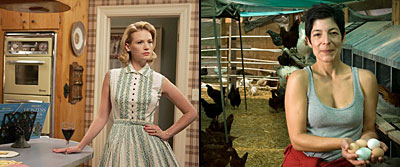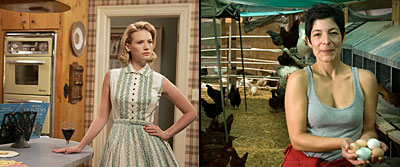 Playing chicken: Mad Men über-hausfrau Betty Draper and Bay Area poultry farmer Alexis Koefoed. Koefoed photo: Bart NagelHave locavores and feminists — factions that a few years ago, some bloggers believed to be fundamentally at odds — become allies?
Playing chicken: Mad Men über-hausfrau Betty Draper and Bay Area poultry farmer Alexis Koefoed. Koefoed photo: Bart NagelHave locavores and feminists — factions that a few years ago, some bloggers believed to be fundamentally at odds — become allies?
That’s what Peggy Orenstein suggests in her essay, “The Femivore’s Dilemma,” for today’s New York Times Magazine. The author of several best-selling nonfiction accounts of modern women’s life (and an acquaintance of mine), Orenstein thinks that “the omnivore’s dilemma has provided an unexpected out from the feminist predicament, a way for women to embrace homemaking without becoming [Mad Men housewife] Betty Draper.” Stay-at-home moms — at least four in Orenstein’s Berkeley, Calif., orbit — are these days obsessing less over which high-end stroller to buy (if any) and more about which tomato variety to plant or laying hen with which to stock their backyard coop.
Writes Orenstein:
Femivorism is grounded in the very principles of self-sufficiency, autonomy and personal fulfillment that drove women into the work force in the first place. Given how conscious (not to say obsessive) everyone has become about the source of their food — who these days can’t wax poetic about compost? — it also confers instant legitimacy. Rather than embodying the limits of one movement, femivores expand those of another: feeding their families clean, flavorful food; reducing their carbon footprints; producing sustainably instead of consuming rampantly. What could be more vital, more gratifying, more morally defensible?
She’s on to something. Look around the food movement — the majority of faces are female, and they by no means belong just to “yoga moms” shopping at Whole Foods and farmers markets. An about-to-be-released new book, “Farmer Jane” by Temra Costa, introduces dozens of passionate female farmers, moms, businesswomen, chefs, and activists who are changing the way we eat and farm.
In the conclusion of her essay, the ever-skeptical Orenstein hints at, but does not explore, the tension that underlies this newest flavor of feminism: “If a woman is not careful, it seems, chicken wire can coop her up as surely as any gilded cage.”
And there’s where we all have to be careful. The growing pressure amongst educated women to feed one’s family not only home-cooked but now home-grown food can morph into just another form of guilt for women employed full-time outside the home. In an excellent blog post from 2007, Bay Area writer Jennifer Jeffrey pointed out that “this whole ‘eat local’ concept is so not friendly for women who work.” Jeffrey, who is self-employed, recognizes that she can dash out to her local farmers market when she wants and simmer beans all afternoon:
Ladies, when we cluck our tongues at drive-through lanes and packaged convenience food, we are forgetting that convenience has been our friend. The fact that women hold more executive positions than at any other time in history, and can freely choose any career path they like is in no small part due to the prevalence of supermarkets and the availability of easy-to-prepare foodstuffs.
Perhaps the most important element here is that of “choice.” It was feminists like Betty Friedan who liberated the Betty Drapers of the world, not Swanson’s frozen dinners. Processed-food manufacturers were simply smart enough to provide the MREs for an army that was already on the move.
Seems to me that the women who Orenstein and Jeffreys are writing about are in fact the same women. They are simply viewing their time through different value lenses. Women are now waking up to the fact that despite what commercials tell us, cooking does not have to be a stressful nightly chore for the skirt-wearing member of the family. It’s possible to make a meal together from fresh ingredients in about the same amount of time as boiling dried pasta and nuking some sauce. And while no one has to know the name of the farm their eggs came from, let alone the actual bird (as Orenstein mocks), taking the kids to the farmers market on the weekend is usually a lot more fun than dragging them through Safeway, and so is planting carrots in the back yard.
What do you think, readers? Do you ever wonder if growing, cooking, and canning your own food are somehow at odds with your feminist leanings?




